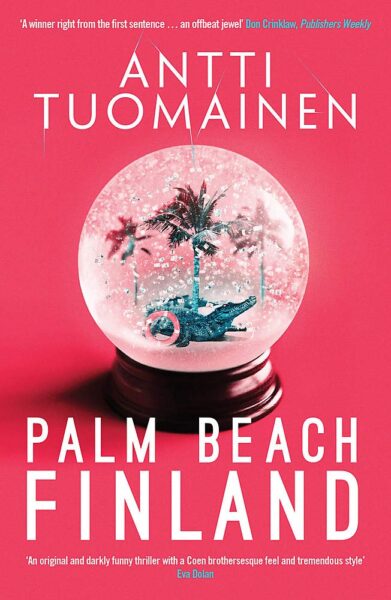
“First a mysterious death, then the sauna burns down. There was always something very clear and explicit about burning down a sauna. If you want to get a Finn’s attention, if you want to tell your compatriot something vital and important, you burn down his sauna. Then he’ll get the message. It lets him know, more effectively than anything else, that you have stepped on his turf, that you don’t respect his territorial integrity, and that nothing between you is sacred.”
Normally, when I go through the feeble steps to post an entry about a book on this site, it tends to deal with something related to the vikings. Usually, but not always, as I’ve made a few exceptions in the past, such as was the case for the novel Men Who Hate Woman (more popularly known as The Girl with the Dragon Tattoo, which is actually an abomination of a name-change that was forced on the book to make it more immediately palatable and thus salable to English-language audiences) and Swell, a hilarious and sadly no-longer-in-print Norumbegan coastal odyssey. These sorts of deviations are one of the primary benefits that come with barely maintaining an unpopular blog that has no real rules.
Anyway, this latest deviation is focused on Palm Beach Finland by Antti Tuomainen, which is a wondrous, little book full of cynical and bizarre black humor, which is my kind of thing. The title basically says it all; if the title does not amuse you, then you probably shouldn’t bother with it, but if it does, then it’s very worth acquiring a copy.
The book is basically a crime novel, but one that is very different in tone from the usual suspects of the ever-popular Nordic noir variety. Many of the standard Nordic noir elements are present, but rather than really engaging in the typical full-blown doom and gloom, Palm Beach Finland instead gets, well, kinda goofy. For starters, the murder that brings the detective to the small Finnish town is itself an accident, rather than a sinister crime that proves to only be the tip of the iceberg of deeper societal problems. And of course the setting is amusing in its own right—basically a tacky beach resort that tries to bring the color and festivity of Florida to the cold, gray summer of the Baltic coast. There’s also a general sense of defeat and dysfunctionality that pervades most of the characters’ actions, as is common for Nordic noir, but in this case the prose is handled in a witty, humorous way, rather than the norm of dry and clinical. And since this isn’t really a book review but more of a book recommendation and because I think that the witty word-play was one of Palm Beach Finland‘s strongest aspects, I’ll leave this at that, literally, because the following are some of the passages that I found to be most endearing:
“‘The name has three words,’ she said. ‘And the last of them is Finland. If you’re looking for a holiday in the sun, do you really think this is top of people’s list?'”
“‘Modern villas,’ said Leivo. Olivia wasn’t sure whether he’d heard her or not. ‘The kind of villas with panoramic windows, open terraces, real architecture.’
Olivia decided not to ask what Leivo meant by the last word.”
“The background music was soul, a classic number – a velvet-voiced man imploring his listeners for some sexual healing. Nyman wondered whether he should wait for the song to end; in the worst case scenario, Olivia Koski would think he had selected this song from the jukebox and was now turning up to instigate a healing procedure of his own.”
“On the stage a red-haired woman was tying a length of white rope between two timbers, apparently with the intention of walking along the rope or performing some kind of acrobatics. Given her advanced stage of inebriation, the performance was sure to be an interesting one.”
“Finns rarely express their emotions, but when they do, they really mean it.”
“The man looked at her. Olivia wasn’t sure what to make of his gaze. It was hard to respond, not so much because it was aimed right at her but because it seemed to be missing something. The man’s a lawyer, Olivia told herself, of course there’s something missing.”
“Attempted robbery: threatening a taxi driver with an ice-hockey stick, seizing his bag of money then hailing the same taxi as a get-away vehicle thirty seconds later.”
“Their faces looked really burned. Or if not exactly burned, then certainly flambéed. That was the word Robin had used. Chico wasn’t sure this was the sort of thing you should tell people. It didn’t sound especially cool. Oh, my face? It’s flambéed.
“Do you know all your guests? Do you engage in any activities that involve fire, danger, and strange men?
Yes, Olivia thought to herself, anonymous pyromaniacs really turn me on.”
“Olivia’s mother was ahead of her time, as they say. A manic-depressive artist trying to bring 1920s Paris to a small Finnish seaside town. Unlike her mother’s mood swings, which were clear for all to see, her artistry was a matter of interpretation.”
“He was plagued by mosquitos, a horsefly bit a chunk out of his neck, the branches and undergrowth scratched and tickled his legs. His bare ankles made him feel uneasy. He was convinced he could hear the surrounding Lyme disease whispering his name.”
“He didn’t normally consider himself a self-destructive person. He wasn’t on suicide watch, someone that had to be guarded in case he harmed himself. In Chico’s experience, life and the world around him took care of that for him. He didn’t need his own actions to add to the hurt.”
“‘Where does he play? What does he play? I’ve never heard of any of his bands. He came by my store one day to put up a poster. Endless Cowboys, or something.’
‘Endless Cowboys is one of his bands, country-rock fusion. Then there’s Endless Enemas, that’s the heavy stuff. There’s even Endless Plato, which is more poetic, chilled out.'”
“His expression was more open than a moment ago. The whiff of money had changed things. People suddenly became friends. Not friends, perhaps, but something even better: allies who were prepared to sell out their friends.”
“So this whole scenario, in all its absurdity, went as follows: Leivo hires a person or persons to go into her house and fight until one of them dies.”
“They stood facing each other for a moment. Sand, silence, two men. Chico thought of the static Western in which Clint Eastwood held a cigar at the corner of his mouth for two and a half hours and eventually killed everybody.”
“‘Springsteen is hardly sitting in a small town bar, just shy of forty and with no money to his name, wondering how to take out his boss.’
‘Or maybe he his. And there you have it. You said it yourself. Bruce is the boss. He already got rid of all the other bosses.’
‘He didn’t kill them.'”
“Nyman shifted his body weight from his left leg to his right. Crouching was taking its toll on his legs. It was in his heart and knees that he most felt the onset of his fortieth birthday.”
“Sometimes dreams were so heavy that they that they became too much to handle, like a stupid, unopened hundred-kilo rucksack, its straps chafing and throttling him. And he realized that letting go of your dreams was almost like getting out of prison.”
Subscribe to get updates from Scandinavian Aggression!
You know, if you feel like it or whatever. Your email is only used to send updates when new nonsense has been posted to the site. It's stored in the secure abyss of WordPress and not shared anywhere or anyhow else. Skål som fan!
